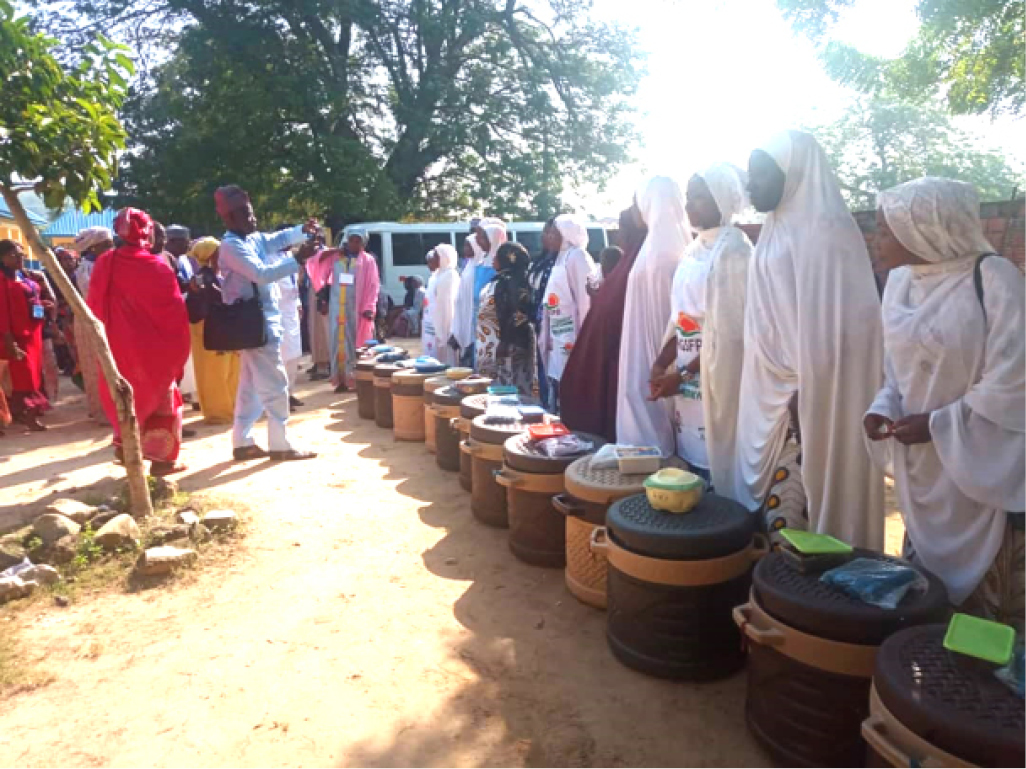Aendors engaged in the National Home Grown School Feeding Programme (NHGSFP) in Niger State have been accused of hiring third-party cooks.
Daily Trust learnt that there are seven items in the menu offered to pupils daily: jollof rice and beef served on Mondays; yam porridge and egg on Tuesdays; while rice and beans was offered on Wednesdays. For Thursdays and Fridays, beans porridge and soya beans with bread were served respectively.
The state adopted what stakeholders referred to as an effective supply chain through the use of aggregators. The butchers association supplied the meat to the vendors; the bakers union supplied bread, while farmers supplied the main food items grown in different parts of the state which comprised of Zone A, main rice hub and zones B and C, noted for yam and beans production respectively. The cooks were engaged directly from their respective communities.
A number of stakeholders however said the programme was successful in the state. Mr Kehinde Arowosegbe, Action Aid PATs-F Coordinator, Kaduna State, declared that Niger was leading in the implementation of the programme in the country.
“We have been to other states and even outside the country, precisely South Africa, and we can say that it is only Niger State that is doing well among other states in school feeding,” he stated.
Also, a presidential aide key to the implementation of the programme, Mrs Titi Doro, commended the state for successfully implementing the initiative and engaging communities in the value chains.
Despite the accolades however, there were problems noticeable mostly in rural schools in the state. In some schools visited in Wawa, New Kurwasa, Old Dogongari and New Bussa in Borgu Local Government Area, some vendors complained of reduction in the quantity of food supplied to them through aggregators.
The drop in amount of food items supplied, they said, affects the pupils’ food ration and sometimes alter the daily menu altogether. In some instances egg was served instead of meat, while in place of jollof rice which is in the menu for Mondays, ‘garau-garau’ which is rice and beans mixed with groundnut oil and ground pepper was served.
Two vendors also complained of being given rotten yams and undried rice and that soya beans sauce was served in limited quantity with bread. Also, four crates of eggs initially supplied to each vendor at the beginning of the programme were reduced to two crates.
The vendors complained of not receiving the right amount of stipend alleging shortchange in the payment process.
The same concerns were raised by vendors in schools in Shiroro, Munya, Magama, Mariga, Paikoro and parts of Minna town.
According to one of them, “we sometimes augment the food items and condiments from our little income even as greater portion of the money goes into transportation.”
Investigation showed that some of the vendors engaged for the programme hardly directly participate in it. They instead hire third parties as cooks and pay them from their monthly stipend.
In a school in Minna, a cook engaged through such arrangement, said she got N5,000 monthly for her effort. “Sometimes the payment is delayed to another month but at least we have something doing,” she said.
She said the challenge of food quality may be due to third party arrangement which relied on those who engaged them for supply instead of getting it directly.
“Whenever they hear that inspectors are coming from Abuja, they will increase the supply,” she claimed.
Parents also accused vendors of sharp practices by converting the food meant for the programme to personal use. A parent who spoke to Daily Trust near UBE Primary School, New Kurwasa, in Borgu Local Government Area said the practice of hiring cooks by the vendors had dented and negated the essence of the programme. According to him, lack of appropriate monitoring mechanism gave room for the malpractices.
Meanwhile, out of 3,124 public schools in the state, feeding is still yet to commence in about 900. The anomaly, it was learnt arose from inconsistency in the information provided by the vendors for the programme in the areas. There were discrepancies in the names earlier given to respective banks and captured in the programme’s data base leaving the affected vendors unable to access fund.
Responding to the complaints put forward by the vendors, the programme officer in the state, Malam Umar Saba, said there were deliberate efforts to address all anomalies noticed, explaining that some of the issues raised were new to the state office as the vendors had never raised them.
He said new yam stored in poorly ventilated rooms got rotten because they contained moisture. “So when we got the report, we decided that we will not move the yams earlier than Friday since they are to be used on Tuesday and that has been working well for us,” he explained.
He also pointed out that complaint over incidences of rotten eggs was alien to state office.
He also said the state office did not envisage food shortage as was claimed, adding that items were distributed based on what was prescribed. “In fact going by the programme’s stipulation, we are supposed to give food vendors six measures of rice for instance, but we give them seven in expectation that since the rice is homegrown if it passes through various processes of destoning it may affect the quantity. So the complaint of quantity cannot be realistic,” he said.
On the accusation of shortchange in stipend, he said that too can’t be true as the vendors and everyone involved were paid directly from the national headquarters through their respective banks.
He also explained that vendors were not supposed to delegate their responsibilities to others, warning that hiring cooks was an offence and the state office would investigate the matter.
However, experts are of the view that if the programme must achieve its aim of reducing hunger and improving the nutritional status of primary school pupils; increase retention and completion rate; increase enrollment and boost agriculture, there is need to expand the scope and further review its funding.
Similarly in Oyo State, investigation revealed that three out of the food items in the menu including rice, beans and wheat for making bread are reportedly not produced in the state.
According to the menu, pupils eat corn porridge and beans on Mondays while rice, vegetables and meat are scheduled for Tuesdays. On Wednesdays, pupils are expected to be fed bread and stew with meat and on Thursdays, jollof rice and egg while beans and corn are slated for Fridays.
Our sources however revealed that bread was supplied to the vendors by a baker on contract.
It was learnt that vendors in the state stopped supplying food to schools in October because they did not receive payment.
A vendor at a primary school in Akinyele Local Government Area said the state did not produce wheat so the vendors resorted to cassava bread.
The “vendors buy all foodstuff at Bodija and Ojo Oba, here in Ibadan. Though there are things supplied by the state government such as bread, other things are being produced locally,” he said.
Teachers at Baptist Primary School, Idi Ikan, Ibadan, Ebenezer African Church Primary School, Ibadan Municipal Government Primary School, Salvation Army Primary School, St. Patrick Primary School and Ojoo Primary School, told our correspondent that the vendors did not visit the schools in the last week of October due to lack of payment.
But the situation is different in some areas of the state because vendors were seen giving food to pupils at Baptist Primary School Oge, LGA Primary School Isaletaba and Ajegunle Baptist Primary School in Saki West Local Government Area.
However in other areas, in Oyo town, free meals are given to pupils in primary 1-3 while those in primary 4-6 are left out.
A parent, Mr Adetayo Ishola, faulted the programme saying the parents should be empowered to feed their children rather than providing them with food in school.
“I think it would have been more reasonable if the government had provided enabling environment for parents to care for their children. As we speak, the country is in bad shape. How many parents can afford to give three good meals for their children,” he queried.
However, another parent, Mrs Ayangbola, said the programme encourages kids to attend school.
“My children like the free meals in school. I want to commend the federal government for effort,” she said.
Story supported by MacArthur Foundation.

 Join Daily Trust WhatsApp Community For Quick Access To News and Happenings Around You.
Join Daily Trust WhatsApp Community For Quick Access To News and Happenings Around You.


